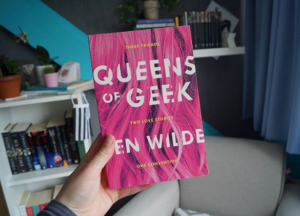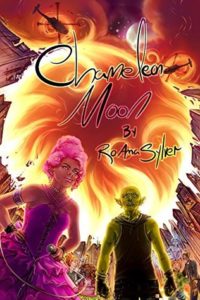[We all know that I’ve been friends with Laura almost since I began blogging and I feel so lucky and grateful. She’s been such a source of comfort and inspiration these last two years. Please go check out her passionate book reviews on Green Tea & Paperbacks!]
First of all, I want to wish Lili an amazing 2 year blog anniversary! I hope you’ll keep blogging for a long time, because your blog is one of my favorites and it inspires me so much. Thank you for letting me participate in your celebration, and thank you for your friendship!
When I heard the theme of the posts,
I was a bit hesitant. Representation is such an amazing thing, but I don’t actively seek out book that represent me. Why? Because it can be incredibly painful. Like, when I read about a character who’s fat, like me, there’s often a lot of fatphobia involved in the story line. Fatphobia is something I have quite a bit of experience with, and while it can be validating to see that in a book, it’s also painful. It reminds me of all of the times people have said that stuff about me, and that’s not fun.
Or when it comes to my anxiety. Reading is often my escape from my super anxious thoughts, but when I read about a character who has the same anxious thoughts as I do, I will start to feel extra anxious. It’s incredibly triggering for me, and because of that, I will not actively seek it out.
Because of this, I don’t have a lot of books that I see myself represented in. But there are two books that I do recognizes pieces of myself in, and these books mean a lot to me.

The first one of these books is Queens of Geek by Jen Wilde. I could clearly see parts of myself in two of the main characters. I could see my bisexuality in Charlie. Almost everything about Charlie is different from who I am. She’s spontaneous, isn’t afraid of the spotlight, isn’t shy, etc. Her bisexuality is different from mine too (I won’t explain why because then we’d probably be here all day), but seeing her talking about her ex-boyfriend and falling for another girl was so incredibly empowering. I read the book in a time where I was still struggling with accepting myself, and it made me think that maybe, just maybe, I wasn’t that weird.
I could also see myself in the other main character, Taylor, because she deals with anxiety and she’s fat. Her anxiety is, again, very different from mine, but I definitely recognized some of her thought patterns. There are also scenes in the book where people are being pretty fatphobic towards her and, while that was incredibly painful to read about, things like that have definitely happened in my own life.
Now, let’s talk panic attacks. Panic attacks are a huge part of my life. I deal with them a lot, and a big part of my life is influenced by them. On the one hand I really want to read about a character who has them too because, while I know that I’m not alone, it definitely feels that way sometimes. But, every time I read about a panic attack, I get one too. And that’s just not worth it for me. The only time I’ve been able to read about someone who experiences these awful things too, was while reading Chameleon Moon.
 In Chameleon Moon there’s a character named Regan. He’s a lizard, and he experiences panic attacks almost the exact same way I do: he feels like he can’t breathe, and he wants to dissapear – which he sometimes does by turning invisible. The reason why I’m able to read this book, even though this stuff should be incredibly triggering to me, is because there’s usually people around Regan who help him. Who can calm him down, tell him that he’s okay, and that he’ll get through this. Some of the stuff that these characters say to him are basically printed on my brain, and I repeat them to myself whenever I’m having a panic attack. They help me a lot.
In Chameleon Moon there’s a character named Regan. He’s a lizard, and he experiences panic attacks almost the exact same way I do: he feels like he can’t breathe, and he wants to dissapear – which he sometimes does by turning invisible. The reason why I’m able to read this book, even though this stuff should be incredibly triggering to me, is because there’s usually people around Regan who help him. Who can calm him down, tell him that he’s okay, and that he’ll get through this. Some of the stuff that these characters say to him are basically printed on my brain, and I repeat them to myself whenever I’m having a panic attack. They help me a lot.
What I also love about the whole Chameleon Moon universe is that there are multiple people who deal with mental illnesses, not just one person, like you usually see in books. They support each other, and love each other, and there are even robot therapy cats.
What’s Next?
I wish books that deal with different marginalizations would do the same as this book did for me: make sure that the people who have these marginalizations can actually read the book, and come out of the book feeling better than they did before. A lot of these books only deal with the bad stuff, the stuff that we’re trying to escape from by reading, and while that’s important, you can also talk about the bad stuff while still uplifting the readers.
I really hope that, one day, I’ll be able to read more books that represent me. But for now, I’m incredibly thankful for the books that do, even if I can’t read them. And Lili, thank you again for letting me share this. Happy anniversary!